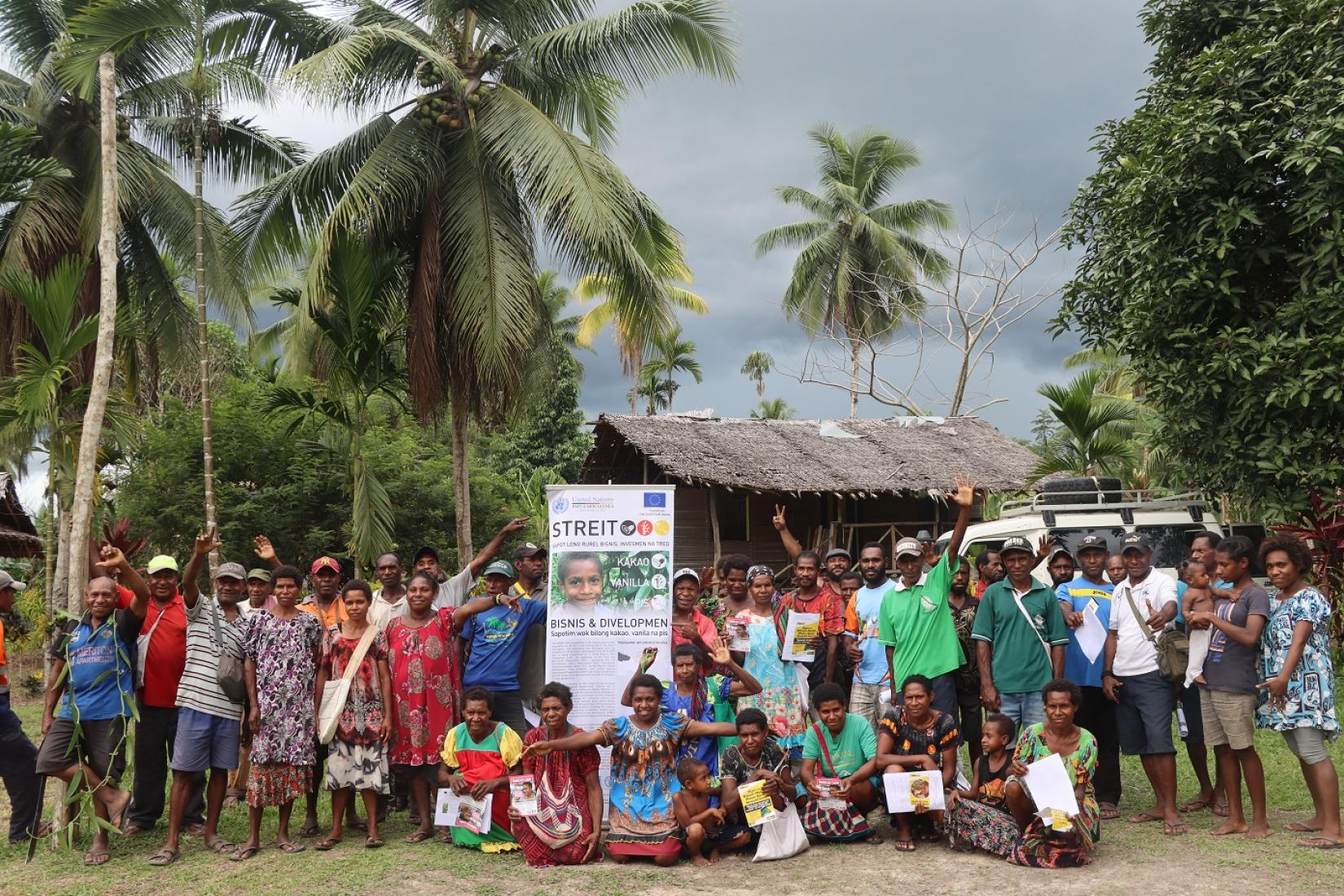|
Wewak, ESP – The Food and Agriculture Organization of the United Nations (FAO) under the EU Funded UN Joint STREIT Programme in Papua New Guinea recently conducted 6 capacity building trainings for cocoa and vanilla farmers in different remote parts of the Greater Sepik Region. The interests shown by the youths were the highlights in all training venues who made up 54% of total 626 trainees.
Conducted in collaboration with Cocoa Board and Provincial Division of Agriculture and Livestock, 4 out of 6 trainings were focused on imparting knowledge, techniques and skills on cocoa bud grafting (propagation) that were held in Fatima, Lumi District Sandaun Province, and in Passam Village, Wewak Rural District, East Sepik Province. The two other trainings were organised in close collaboration with the DAL/Spice Board to build the capacity of rural farmers in Mioseng Village, Drekikier, and Aupik Village, Maprik District, East Sepik Province on ‘Vanilla, Husbandry and Processing.
It was the first for many enthusiastic girls and boys to attend a formal, tailored training on advanced, efficient agricultural practices. The participants are expected to pass on the new skills to at least 10 other people in their clusters. “I know how to look after my plants, but I now know my mistakes to improve,” said Wilson Kuma, 23, a participant farmer from Mioseng Village in Drekikier.
|
Many rural farmers live on cocoa gardens and cocoa cultivation that have been affected by cocoa pod borer (CPB) pests’ infestation, which destroyed the lifeline of almost the entire cocoa-dependant rural population in the Greater Sepik Region. Hence, the desire for new knowledge and support to revive these CPB infested trees resulted in an additional 75 participants who attended as observers in the 3 cocoa block management trainings in Sandaun Province. “EU-STREIT PNG Programme encourage the equal participation of women and youth as they play important role on the development of cocoa value chain. The technical skill gained from the budding training enables participants to replace old cocoa trees with new clone seedlings to increase production and improve livelihood.” explained Dr Rabi Rasaily, the Programme’s Senior Agricultural Officer (Cocoa, Vanilla and Energy) who led the mission to Sandaun Province.
The trainings, which include practical sessions, also covered Integrated Pest and Disease Management (IPDM) that will enable farmers to apply appropriate pruning and shade control practices on their blocks as per eco-friendly methods and practices with zero tolerance on use of pesticides.
The Cocoa farmers were also presented with shade clothes and 15,000 poly bags to raise their CPB tolerant seedlings in new nursery set-ups supported by EU-STREIT PNG Programme.
Meanwhile, rural dwellers who attended the vanilla sessions were also trained on how to pollinate the vanilla flowers efficiently by using a simple but viable technique to lift the rostellum, which acts as a shield between the stamen and stigma, and press the stamen with the thumb gently down to the stigma for a successful pollination. “The advantage of this method is the speed and accuracy to pollinate flowers in the morning between 6.30 am and 10.30 am,” explained Mr Nanda Siri, the Programme’s National Vanilla Production Officer to farmers in Moiseng Village, Drekikier.
As an integral part of sustainable agri-food value chains development, awareness was also conducted among the participants to recognise, appreciate and further promote women’s vital roles and contribution to households and communities and how they can be engaged as equal partners along all nodes of agri-food value chains, including but not limited to decision-making, financial management and establishing new and running existing ventures to increase sustainably the household- and community-level economic returns and wellbeing. During the training in Passam Village, Mrs Patu Shang, the Gender and Youth Inclusion Specialist of the Programme said: “So many things have been done in the past without women who actually contribute more than 50% of work from household chores to farming and it is a pity that we do not know their position in the agri-food value chain,”, said Mrs Shang.
|
“Imagine your big sister, small sister or mother, you are doing development, and she is not there, so we must not put women behind because without women, there are no men,” added Mrs Shang.
|
The EU-STREIT PNG, being implemented as a UN Joint Programme (FAO as the leading agency/administrative agent, and ILO, ITU, UNCDF and UNDP as implementing partners), is the largest grant-funded Programme of the European Union in the country and the Pacific region, which focuses on increasing sustainable and inclusive economic development of rural areas through Increasing the economic returns and opportunities from cocoa, vanilla and fishery value chains and strengthening and improving the efficiency of value chain enablers including the business environment and supporting sustainable, climate-resilient transport and energy infrastructure development.
|
|








